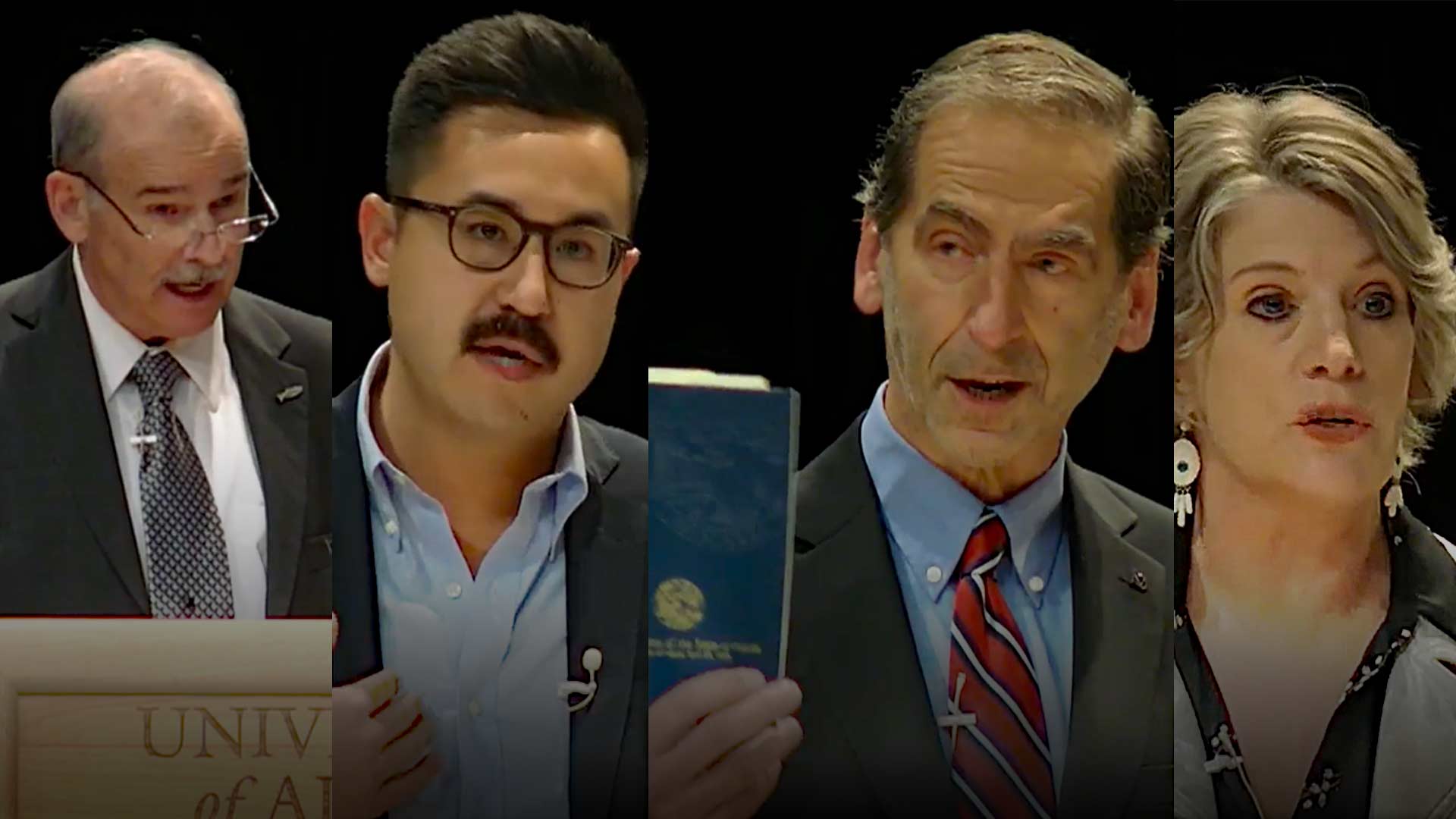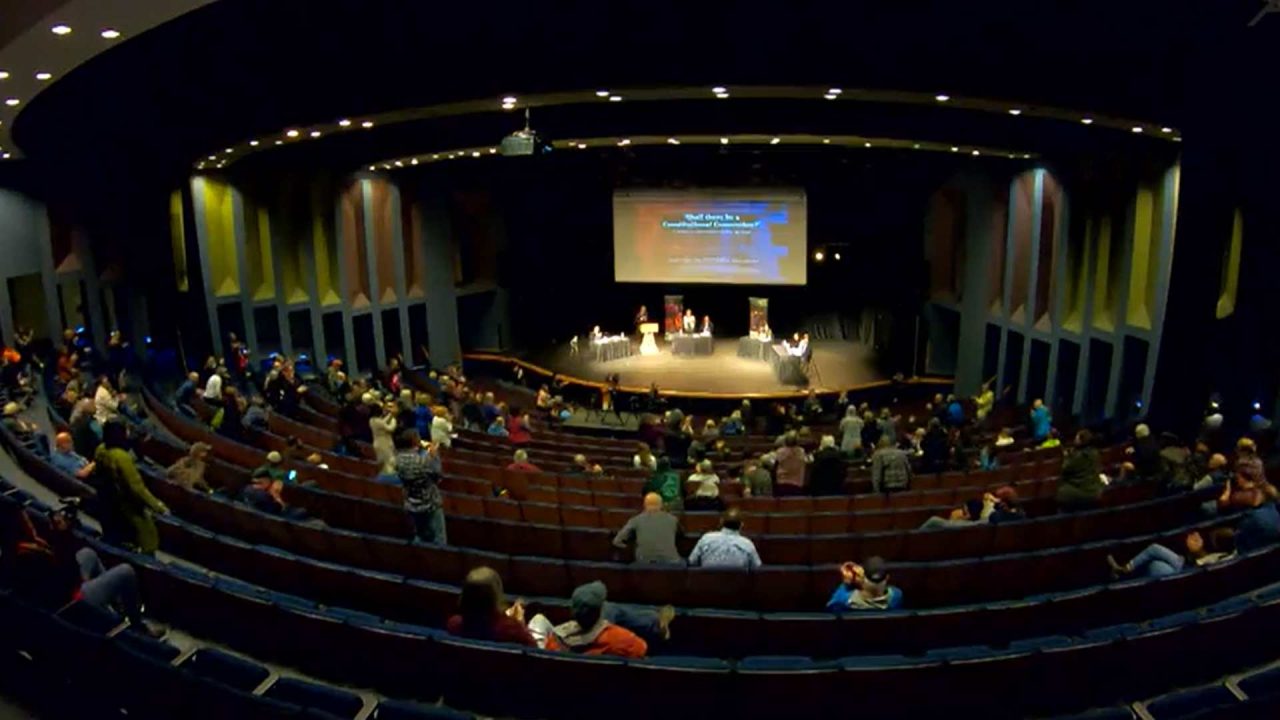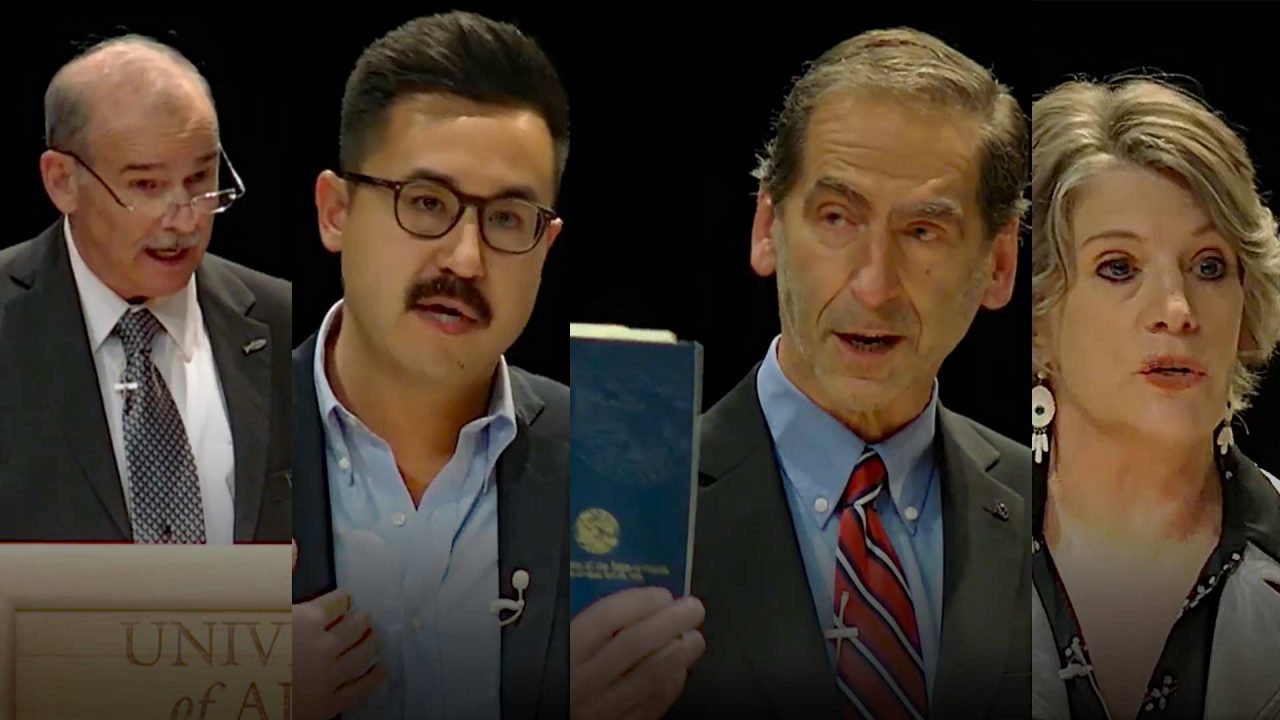
Roughly 100 people turned out for the Sept. 29 debate over whether Alaskans should vote on Nov. 8 to call for a state-level constitutional convention, a question which Alaskans are asked every 10 years in accord with the state’s constitution.

Organized by news outlets Alaska Public Media, Anchorage Daily News and Alaska Beacon, along with the University of Alaska Debate Team, the one-hour, back-and-forth contest featured pro-constitutional debaters, former U.S. Senate candidate and current Alaskan Independence Party Chairman Bob Bird and former Lt. Gov. Loren Leman. The opposing side consisted of Joelle Hall (Union President of Alaska AFL-CIO) and Matt Shuckerow (owner of Fathom Strategic Communications).
Bird kicked things off at the UAA Wendy Williamson Theater by arguing that those opposed to a constitutional convention are attempting to scare rank-and-file Alaskans with a campaign funded by dark money. He said they simply don’t trust voters to correct and hold accountable lawmakers, judges and the executive branch which have abused their power by usurping their legal roles.
Bird noted that the State Legislature has violated its own statutes regarding payment of a full PFD, the courts have violated constitutional laws by unlawfully seizing and defining the right to privacy and by taking away line-item veto powers from the governor. He also noted that run-away courts have refused to let grand juries investigate potential crimes by government officials, and have usurped state laws when it comes to election proceedings.
ALASKA WATCHMAN DIRECT TO YOUR INBOX
Joelle Hall, the co-chair of the anti-constitutional convention group – Alaskans Defending Our Constitution – argued throughout the night that a convention is “unnecessary, expensive and dangerous.” She repeatedly said it would foster “unpredictability” with regard hot-button issues like access to natural resources, taxation, abortion access, gender and sexual orientation laws, the PFD, wildlife management, judge selection and whether the state should expand school choice by allowing state spending on private schools.
Hall said Alaskans already have a way to address constitutional changes through the amendment process directed by the Legislature, and that there was no need to open “pandora’s box” by calling a convention.
She said expressed “deep concern” that a convention might change abortion law in Alaska, and argued that a convention would cost tens of millions of dollars to pull off.
Hall also emphasized that the process of electing delegates to a convention was uncertain and unpredictable, as those determinations ultimately reside with the Legislature.
Lehman countered with the fact that he trusts Alaskans to make wise and prudent decisions, and said it was past time to revisit some sections of the constitution, especially the process by which Alaska appoints judges. He said the seven-member Alaska Judicial Council has far too much power to nix good judicial candidates from serving as judges.
Shuckerow worried that a constitutional convention might entail the elimination of Alaska’s’ borough systems and the establishment of county sheriffs.
Shuckerow mostly focused on the fact that a convention was too “risky,” citing financial uncertainty in the business climate and the fact that we don’t know the process and rules by which the Legislature would establish how a convention would proceed.
Bird acknowledged that a convention is somewhat unpredictable, but so is daily life in general. That said, he observed that there is a multi-prong and lengthy process to ensure that any changes would be ultimately approved by Alaskans through a popular vote. Bird added that Alaskans deserve a chance to protect their PFD, revisit how judges are selected and address the issues of privacy, which the courts have interpreted to include a right to abortion.
“Who do you want to determine personhood?” Bird said. “Unelected judges or your friends and neighbors, or their elected representatives in the Legislature?”
Shuckerow, countered, saying a constitutional convention might entail the elimination of Alaska’s’ borough systems and establish county sheriffs. He also worried that a convention might result in other changes – currently unknown.
Lehman returned to the fact that he trusts Alaskan voters, and said a constitutional convention is the best way to let them decide critical issues which the Legislature has failed to address.
Bob Bird said Alaskans deserve a shot at addressing problematic concerns which the Legislature seems unwilling or able to tackle.
Hall returned to her concern over how delegates might be selected. She said it could be that the rules favor those with established name recognition and deep pockets.
Bird agreed that the process of selecting delegates should not give current legislators or those with sizable finances or name recognition a leg up on rank-and-file Alaskans.
Both Bird and Lehman maintained that the constitution does not need an overhaul, but does need to be tweaked to address changes since it was first established in the 1950’s. Bird called for a “facelift.”
When asked whether they believed a convention would adequately represent the interests of minority groups, Hall worried that women might not be properly represented.
“We don’t fear the Alaska voter who will be asked to approve the amendments.”
– Loren Leman
Lehman retorted that the current Legislature enjoys wide representation, across multiple regions, and doesn’t see why that wouldn’t be the case at a convention.
As to the issue of uncertainty – which was the main argument from the convention “no” side, Bird said the tactic of “feeding a fear” of the unknown was uncalled for. He said Alaskans have multiple opportunities to address how the convention works, how delegates are selected, what issues they address and whether those issues are acceptable to the majority of voters.
In the end, Lehman put his trust in Alaskans to make the right call.
“We don’t fear the Alaska voter,” he said.
Click here to watch the debate.








11 Comments
What are both sides so afraid of? Murder(abortion), the PFD, judges, school board members, common core, let’s get it all out on the table before the election. That’s the only way the public can be prepared to vote yes/no for a con con responsibility.
Agree
Alaskans should vote in favor of calling a constitutional convention.
Vote yes
“debate over whether Alaskans should vote on Nov. 8 to call for a state-level constitutional convention,”
Maybe I am not understanding something, but every time I hear this wording, I am just amazed at how people will not listen when others speak. This decision whether there should be a vote for a constitutional convention should be left up to the residents of this state. I, for one, am not okay with a small group of people deciding for me whether or not I should get a choice to vote on this topic of extreme importance. People who care for Alaska and the direction that it is going and whether it will be “Alaska” in the future for our children, grandchildren, and lineage need to speak up and let these little groups know that WE THE PEOPLE are not okay with being pushed out of the decision-making process.
Just to let you guys know, in Kenai we had a room full of people live streaming the debate. I think I can accurately say we didn’t buy the arguments of the no panel. We raised a little money for the yes campaign.
Good to hear.. The “No Panel” fears the will of the people being strengthened, and enforced. It is the people who are the legitimate, and final arbiters of the direction in which path we travel.
Former Lt. Gov. Loren *Leman
At the end of the debate there was a call-in poll to see if viewers were a Yes, or a No on the Constitutional Convention. The Yes’s lost. There’s a reason for this loss. Most Conservatives don’t participate in call in polls. Most Conservatives don’t want their phone numbers floating around on any data base for someone to hack or pass on to a third party. So this poll was a key indicator to NOT trust polls.
I am a YES for the Constitution Convention.
All those in favor of a Constitution Conventional take a deep breath, those opposed exhale indefinitely.
Vote yes for a constitutional convention! Put it back in the hands of Alaska!!
This state needs to have the constitution looked over by the citizens to make appropiate changes or tweeking to ensure the legislature does the bidding of the citizens and not for their personal concerns. If people are concerned about outlandish changes, then perhaps they should take direct action themselves. Take part in this states development by participation in this convention. Only some politicians are voicing concern due to fear of losing their power. The citizens of Alaska should be the only power.
The process of the convention has three… count them three votes of the public.
1. public vote to have the convention.
2. public votes for members of the convention, that only propose – not make changes.
3 public vote of the people on each proposal coming out of the convention.
So the only thing to fear is the people of Alaska.
I for one fear the people less than professional politicians, unions, oil companies, and the dark money from Washington seeking to scare us into not trusting ourselves or our Alaska constitution
If you truly defend the constitution then then you should support the convention process, because the constitution provides for the convention process.
WE THE PEOPLE will have a say in the convention,
only powerful money interests have a say anywhere else.
WE NEED A CONCON !!! Other wise the largest group of millionaires In Juneau will continue to rule and reign over alaska with a greedy fist ! We need reps where the PEOPLE ARE ! where the common man is.